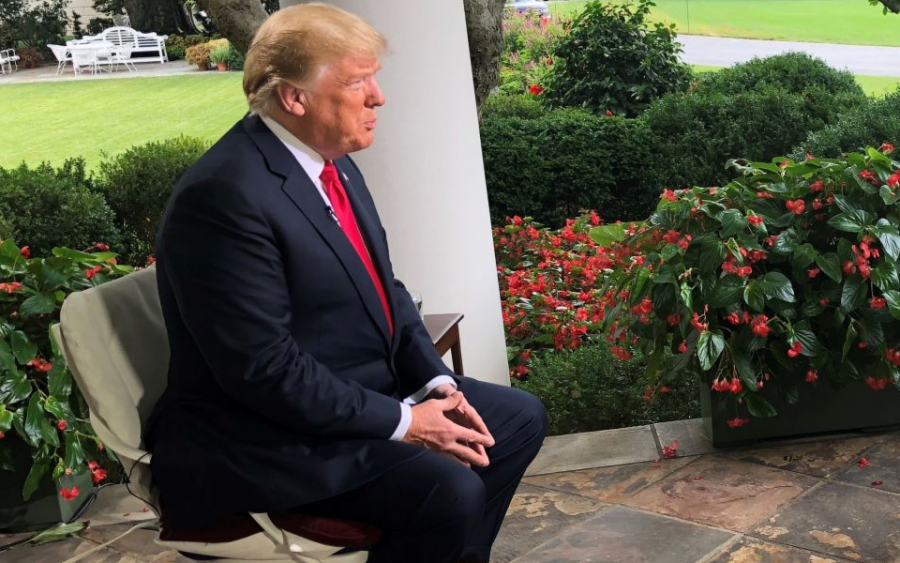This past Monday, Paul Manafort, Trump's former campaign chairman, was found guilty on 8 counts of financial crimes. On the same day, Michael Cohen, Trump's former attorney, pleaded guilty to eight counts of tax fraud, bank fraud, and campaign finance violations. Some - apparently including Trump - believe the guilty plea is a sign that he is willing to cooperate with Special Counsel Robert Mueller's investigation.
Trump characteristically reacted to the news via Twitter, saying, "I feel very badly for Paul Manafort and his wonderful family. "Justice" took a 12 year old tax case, among other things, applied tremendous pressure on him and, unlike Michael Cohen, he refused to "break" - make up stories in order to get a "deal." Such respect for a brave man!" Although Trump's attorneys and advisors have reportedly advised Trump not to pardon Manafort, some sources in the White House believe that Trump may still do so.
Trump also lashed out at Cohen in an interview with Fox News, accusing him of testifying against former associates to avoid legal punishment: "It's called flipping and it almost ought to be illegal." Trump's opinion on the matter is certainly unorthodox; it is a common practice for prosecutors to exchange lighter sentences for valuable information about crimes committed. Trump also attempted to distance himself from Cohen's crimes and minimize the seriousness of the charges, claiming (falsely) that the campaign finance violations Cohen committed were not really crimes.
Meanwhile, Allen Weisselberg, the chief financial officer of the Trump organization, and David Pecker, the owner of the National Enquirer tabloid and a longtime Trump friend, have both been granted immunity to speak freely to prosecutors in the Southern District of New York relating to Cohen's case. White House Counsel Don McGahn is also apparently cooperating with Mueller's investigation and is reportedly not exactly Trump's biggest fan.
On the defensive after a week of bad news, Trump again began criticizing Attorney General Jeff Sessions' decision to recuse himself from the Mueller investigation and accusing him of "never tak[ing] control" of the Justice Department. Sessions defended himself in a statement, "While I am Attorney General, the actions of the Department of Justice will not be improperly influenced by political considerations," and, "I took control of the Department of Justice the day I was sworn in, which is why we have had unprecedented success at effectuating the President's agenda." Unfazed by Sessions' rebuttal, Trump used it as an opportunity to call on Sessions via Twitter to begin prosecuting Democrats and Trump critics.
Sessions was not the only White House appointee to draw the President's ire this week: Trump also criticized Fed Chairman Jerome Powell for raising interest rates, which he believes is hindering the growth of the American economy.
Through all the turmoil surrounding the legal investigations into Trump, his administration has continued advancing their goals: on Tuesday, the EPA dialed back an Obama-era law capping pollution from coal-burning power plants. It's estimated that scrapping the law will contribute to 1,400 deaths per year by 2030 from an increase in particles linked to lung and heart disease.
Finally, longtime Republican Senator John McCain died yesterday of cancer at age 81. McCain was an occasional Trump critic, and the two sometimes sparred publicly. Trump offered condolences to McCain's family via Twitter.
- https://www.nbcnews.com/news/all/manafort-convicted-8-counts-n901231
- https://slate.com/news-and-politics/2018/08/michael-cohen-cooperation-deal-he-doesnt-have-one-he-still-might-end-up-cooperating.html
- https://twitter.com/realDonaldTrump/status/1032256443985084417?ref_src=twsrc%5Etfw%7Ctwcamp%5Etweetembed%7Ctwterm%5E1032256443985084417&ref_url=https%3A%2F%2Fwww.huffingtonpost.com%2Fentry%2Ftrump-manafort-trial-verdict-mueller_us_5b7b37bfe4b0a5b1febe1961
- https://www.politico.com/story/2018/08/24/trump-manafort-pardon-white-house-aides-795712
- https://www.cnn.com/2018/08/23/politics/trump-flipping-outlawed/index.html
- https://www.cnn.com/2018/08/23/politics/trump-jeff-sessions-justice-department/index.html
- http://www.latimes.com/politics/la-na-pol-sessions-trump-improperly-influenced-20180823-story.html
- https://twitter.com/realDonaldTrump/status/1033332301579661312
- https://nypost.com/2018/08/18/white-house-counsel-cooperated-extensively-with-mueller-team/
- https://www.businessinsider.com/don-mcgahn-calls-trump-king-kong-2018-8
- https://money.cnn.com/2018/08/20/news/economy/trump-fed-powell/index.html
- https://www.nytimes.com/2018/08/21/climate/epa-coal-pollution-deaths.html
- https://www.bbc.com/news/world-us-canada-45313845
- https://twitter.com/realDonaldTrump?ref_src=twsrc%5Egoogle%7Ctwcamp%5Eserp%7Ctwgr%5Eauthor



















